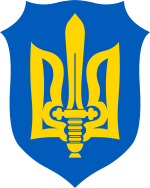The Organisation of Ukrainian Nationalists (Організація українських націоналістів) is, along with the Congress of Ukrainian Nationalists (KUN), one of the revival moments of the original OUN party of the 1920s.
The OUN was a far-right authoritarian leaning political party that began in the 1920s, splitting into 2 factions in the 1930s, the OUN (M) led by Andriy Melnyk, and a splinter party called the OUN (B) led by Stepan Bandera, both groups collaborated with Nazi Germany in World War 2 and supported the German invasion of Ukraine (and the wider USSR) with volunteer troops, but the relations between the OUN and German occupiers quickly collapsed after Bandera declared Ukrainian independence, which the Nazis were against, Bandera was arrested and send to a concentration camp and later so was Melnyk, although as “honorary inmates” treated much more humanely than most in the camps.
Shortly before the war ended and well after the Nazis had lost control of former Soviet territory, the OUN leaders were released and the Nazis offered their support for Ukrainian independence, but shortly after they lost the war as their top leadership died or surrendered. The Soviets then suppressed the OUN movement, forcing their members into exile or the underground.
Bandera remained in West Germany under the protection of the CIA until he was assassinated by a Soviet agent in the 1960s, while Melnyk later moved to Luxembourg where he later died of natural causes, their movements lived on however and when Ukraine became independent they returned to the country, with the OUN (B) remnants forming the KUN and OUN (M) forming this party, simply known by its original name of the Organisation of Ukrainian Nationalists.
After the breakout of the Donbas War the party founded a volunteer battalion called the OUN Battalion, initially as part of the Azov Battalion and later as an independent unit, but the unit broke with the party’s leadership and later disbanded.
For the (as of June 2025) latest Ukrainian Presidential elections the party endorsed a joint candidate alongside Svoboda, the Congress of Ukrainian Nationalists, Right Sector and C14, Svoboda’s Ruslan Koshulinsky1.
Back to 000. MOC Notables Pro-Ukrainian
